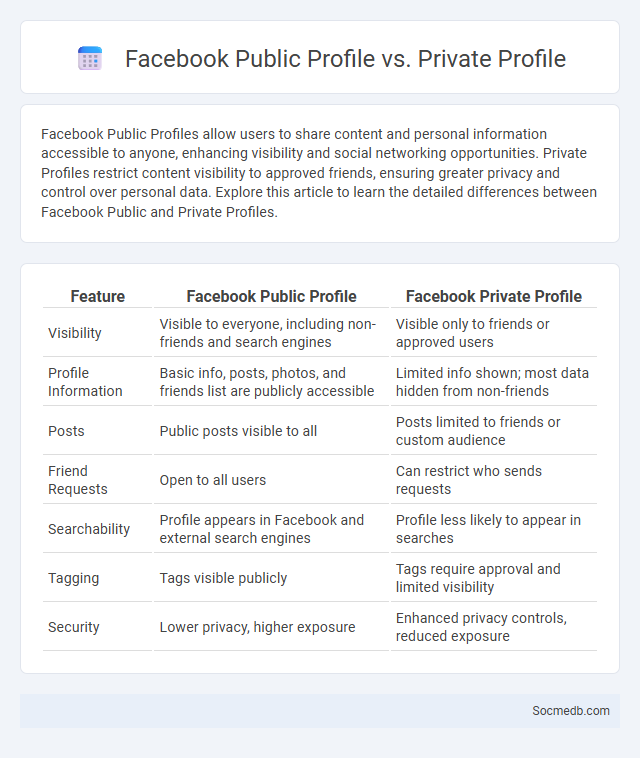
Photo illustration: Facebook Public Profile vs Private Profile
Facebook Public Profiles allow users to share content and personal information accessible to anyone, enhancing visibility and social networking opportunities. Private Profiles restrict content visibility to approved friends, ensuring greater privacy and control over personal data. Explore this article to learn the detailed differences between Facebook Public and Private Profiles.
Table of Comparison
| Feature | Facebook Public Profile | Facebook Private Profile |
|---|---|---|
| Visibility | Visible to everyone, including non-friends and search engines | Visible only to friends or approved users |
| Profile Information | Basic info, posts, photos, and friends list are publicly accessible | Limited info shown; most data hidden from non-friends |
| Posts | Public posts visible to all | Posts limited to friends or custom audience |
| Friend Requests | Open to all users | Can restrict who sends requests |
| Searchability | Profile appears in Facebook and external search engines | Profile less likely to appear in searches |
| Tagging | Tags visible publicly | Tags require approval and limited visibility |
| Security | Lower privacy, higher exposure | Enhanced privacy controls, reduced exposure |
Understanding Facebook Public Profiles
Facebook public profiles display essential information such as name, profile picture, cover photo, and public posts accessible to everyone. Understanding privacy settings helps you control what personal details are visible to strangers while maximizing your network reach. You can optimize your public profile for professional connections by highlighting work experience, education, and contact information.
What Defines a Facebook Private Profile?
A Facebook private profile restricts access to personal information, posts, and photos, allowing only approved friends to view content. Privacy settings such as "Who can see your posts?" and "Who can look you up using the email address or phone number you provided?" control visibility and friend requests. These settings enhance user control over data exposure, protecting against unwanted interactions and data scraping.
Key Differences Between Public and Private Profiles
Public social media profiles allow your content to be viewed and shared by anyone on the platform, enhancing visibility and engagement but reducing control over privacy. Private profiles restrict content access to approved followers, ensuring greater security and exclusivity for personal information and posts. Understanding these differences helps you tailor your social media experience to fit your privacy needs and networking goals.
Advantages of Keeping Your Profile Public
Keeping your social media profile public increases visibility and fosters broader networking opportunities, essential for personal branding and professional growth. Public profiles enable easier content sharing and engagement, leading to higher follower interaction and potential collaboration offers. Enhanced discoverability on platforms like Instagram, LinkedIn, and Twitter promotes influence expansion and career advancement prospects.
Benefits of a Private Facebook Profile
A private Facebook profile enhances personal privacy by limiting access to posts, photos, and personal information only to approved friends, reducing the risk of data misuse and identity theft. It allows users to control their digital footprint, ensuring that sensitive content is shared selectively, which fosters safer online interactions. This privacy setting also helps prevent unwanted contact and cyberbullying, creating a more secure and comfortable social media experience.
What Is a Digital Footprint?
A digital footprint refers to the trail of data you leave behind when using social media platforms, including posts, likes, comments, and shared content. This footprint can reveal personal information, habits, and preferences to others, affecting your online reputation and privacy. Managing your digital footprint is essential for protecting your identity and ensuring positive interactions in the digital world.
How Facebook Profiles Shape Your Digital Footprint
Facebook profiles play a crucial role in shaping your digital footprint by publicly displaying personal information, interests, and social connections that search engines can index. The visibility of posts, photos, and interactions on Facebook influences online reputation and professional opportunities, as recruiters and employers often review these profiles during background checks. Managing privacy settings and curating content carefully help control the narrative of your digital identity, impacting long-term personal and career prospects.
Privacy Risks: Public Profile vs Private Profile
Social media platforms present distinct privacy risks depending on whether a user maintains a public or private profile. Public profiles expose personal information, photos, and activities to a broad audience, increasing the likelihood of data mining, identity theft, and targeted advertising. In contrast, private profiles restrict content visibility to approved followers, reducing the risk of unauthorized data access but still requiring vigilance against security breaches and platform data policies.
Managing Your Digital Footprint on Facebook
Managing your digital footprint on Facebook involves regularly reviewing privacy settings to control who can see your posts and personal information, ensuring your online presence reflects your desired image. You should also monitor tagged photos and posts, removing or untagging any content that may negatively impact your reputation. Regularly updating security features and using Facebook's activity log helps you maintain control over your digital imprint.
Best Practices for Profile Privacy and Online Reputation
Maintaining your social media profile privacy involves regularly updating settings to limit personal information visibility, using strong, unique passwords, and reviewing authorized apps connected to your accounts. To protect your online reputation, curate content deliberately by sharing positive, professional posts and monitoring mentions to address any negative comments promptly. Engaging thoughtfully with followers and avoiding controversial topics can further safeguard your digital presence and build trust with your audience.
 socmedb.com
socmedb.com